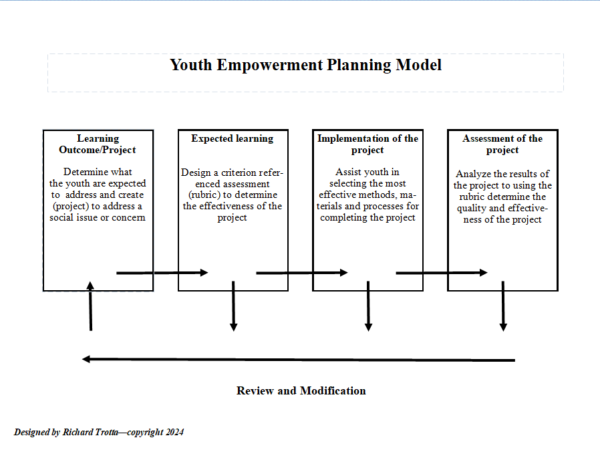Key Elements for Creating Youth Empowerment
Mission:
“Our mission is to empower youth to be leaders by providing them with the tools, resources, and support necessary to unlock their full potential. Through mentorship, education, and community engagement, we strive to cultivate confident, resilient, and socially responsible leaders who will positively impact their communities and the world.”
Project-Based Learning (PBL):
PBL is a teaching/learning method in which students gain knowledge, problem-solving, and leadership skills by working for an extended period to investigate and respond to an authentic, engaging and complex questions, problems, or challenges by creating a project that addresses a social issue or need.
PBL Process:
In small groups, entire groups or individually, the youth will:
1] Identify/select a project that addresses a social issue or other concern that is important/meaningful
2] Design an action plan to address or mitigate the issue or concern
3] Implement the action plan to address the issue or concern
4] Complete the project or make significant strides towards that end and laying the groundwork for ongoing work
5] Utilize the local partner network of experts, mentors, and other volunteers to complete the project
6] Share the narrative and importance of the project on local media, social media, and other news sources
In the PBL process, the students will learn (demonstrate):
1] Leadership skills: planning, communication, problem-solving, teamwork, cooperation, creativity
2] Social-emotional skills: empathy, compassion, self-awareness, personal relationship skills, responsible decision-making, open-mindedness
Authentic Learning
Authentic learning is an instructional approach that allows students to explore, discuss, and meaningfully construct concepts and relationships in contexts involving real-world problems and projects relevant to the learner.
Program Champion:
A member of the organization’s leadership/administration who provides support and guidance for the youth program
Mentor/Advisor/Teacher
An adult in the organization that provides guidance and support for the youth and their projects
Funding
An organization budget, grant, or other sources that are needed for the successful operation of the youth program
Community support
Local organizations, civic groups, businesses, and members of the community
Location
A place where the youth can meet to design and create their projects
Social connections: Collaborating with others to solve a social problem can foster social connections and lead to new opportunities for collaboration and support.
Project-Based Learning Methodology
Project-based learning (PBL) is an effective teaching method because it allows students to apply the skills and knowledge they are learning to real-world problems and projects. This approach helps students develop a deeper understanding of social issues by actively engaging with them and connecting to their experiences. Additionally, project-based learning encourages students to take ownership of their learning by allowing them to direct their projects, which can increase their motivation and engagement. Research suggests that group or team projects can improve learning outcomes. In group projects, students can collaborate and share ideas, leading to a deeper understanding of the material and enhanced critical thinking skills. Team projects also provide students with experience working as a team, an essential skill often valued in the workforce. Group projects can also increase student motivation and engagement in the learning process. Creating a solution to a social problem can have several positive psychological effects:
Sense of purpose: Working to solve a social problem can provide individuals with a sense of purpose and meaning, as they are working towards a goal that they believe will positively impact society.
Empowerment: Creating a solution can also empower individuals, as they are actively taking steps to address an issue they care about. Increased self-esteem: Successfully creating a solution to a social problem can boost self[1]esteem and self-worth, as individuals feel like they have made a meaningful contribution.
Increased motivation: Creating a solution can also improve motivation, as individuals are working towards a goal they are passionate about. Decrease in stress: When an individual actively works towards a solution to a social problem, they can feel a sense of agency and control, decreasing stress.
Positive impact on mental health: The positive emotions and sense of accomplishment associated with creating a solution can also positively affect mental health. Positive implications for the community: The solution to a social problem can have a positive impact on the community, as it can lead to the creation of new resources, the improvement of infrastructure, or the implementation of positive changes.
